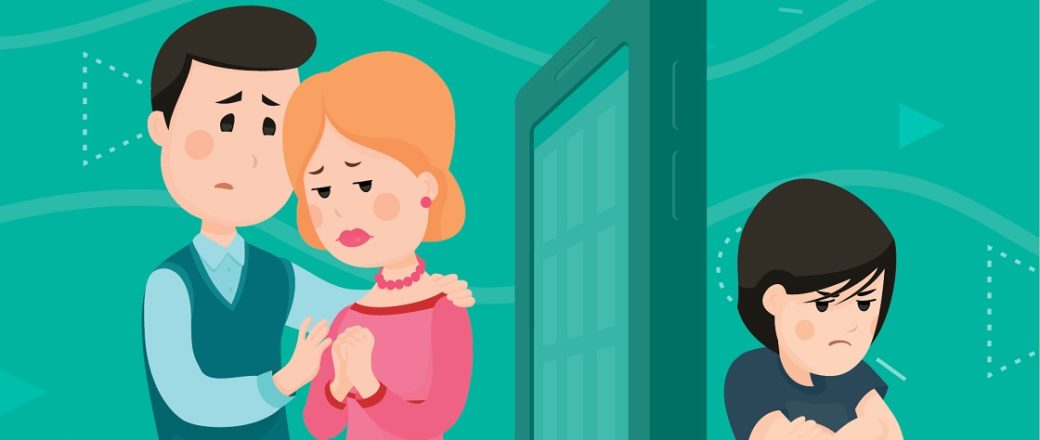Main Findings
- 58% of all parents are friends with their kids on social media; 12% parents who use social media regularly but are not ‘friends’ with their kids say they don’t want their children to see what they’re up to
- 23% of parents say their children prefer to go online rather than talk to them about things – this rises to 32% of parents aged 40 or younger
- 36% of parents under 40 believe that the Internet isolates them from family and friends, and 35% of parents of 14 to 16 year olds feel the Web isolates their child from them
- A fifth of parents (21%) and children (22%) say that the Internet can be the cause of family arguments, rising to 64% of parents who feel they are no longer the primary contact point for their children
- 31% of parents say that their child has broken something on a device and 30% say a child infected a device with a virus while online – with 13% and 16% of children accusing their parents of the same thing
Methodology
The research, undertaken for Kaspersky Lab by iconkids & youth, comprised an online survey of 3,780 families with children aged eight to 16 (one parent and one child per family) in seven countries.
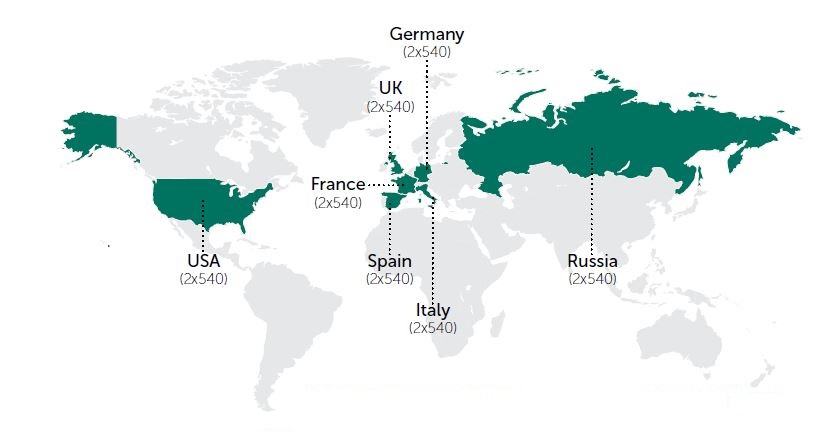
Not all the survey results have been included in this report. To request further data please contact Kaspersky Lab at prhq@kaspersky.com.
New rules of engagement
The study found that the Internet can be a cause of family tension, with parents and children each doing things that make life difficult or even embarrassing for the other. In this sense the online world is no different to the real one when it comes to family life. But it’s a world that comes with new rules of engagement, particularly for parents.
New platform, new rules
Most young people aged over 13 are enthusiastic users of social networks – and so are many of their parents.
Global benchmark data for January 2016 shows that around a third of the global population now has at least one active social media account, although social media adoption varies widely between countries.
In the US, for example, higher levels of social media use among adults (six in ten have an active social media account) mean that many parents (76%) are happy to befriend their children online. In Germany, however, where social media adoption is lower (around a third of adults), just 39% of parents feel comfortable doing this. Overall, 58% of parents are friends with their children online.
Connecting with children on social media provides parents with a valuable opportunity, not just to be a part of their growing children’s lives, but to be on hand to spot potential risks and protect their children.
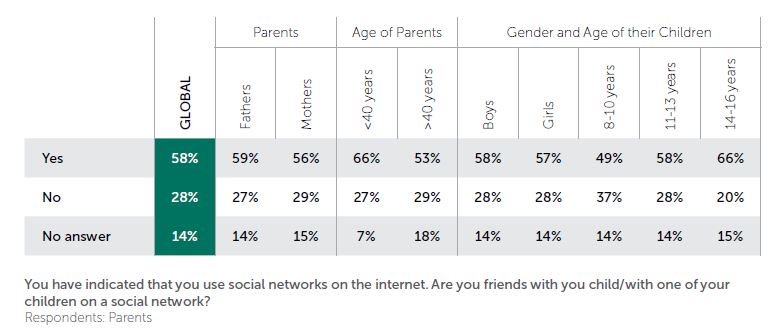
Of those parents who are not connected to their kids on social media, one-in-five (18%) says this is because their children would find it embarrassing. This figure rises to 27% in the UK and, not surprisingly, to 34% among those with children aged 14 to 16.
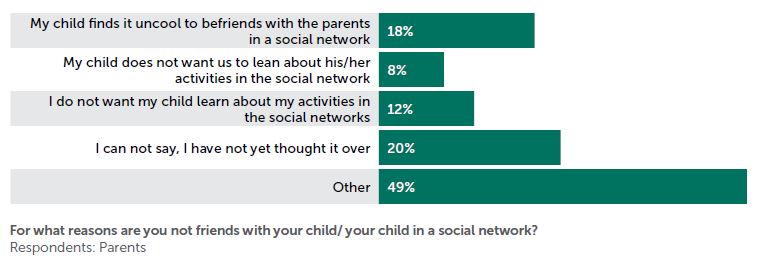
More worrying in some ways is the one-in-eight (12%) parents who don’t connect to their children because they want to keep their own social media activities private.
Anyone but you
Facing the fact that your adolescent children no longer think you have all the answers, or come to you first for advice and support can be a difficult moment for any parent. The Internet, with its vast repository of information and instant connectivity to friends and others can make this moment come sooner than expected.
One-in-four (23%) of the parents surveyed say that the Internet has resulted in them no longer being the first port of call for their children, who prefer to go online rather than talk to them. This figure is slightly higher for 14 to 16 year olds (26%), and for fathers (25%), and slightly lower for mothers (21%).
This is a natural part of growing up, but it could make young people more vulnerable if it means they don’t listen to parental advice about Internet safety, or turn to their parents for help should they encounter distressing or inappropriate content.
Interestingly, this rejection of parents as the primary point of contact is particularly marked among younger parents. 32% of parents aged 40 or younger believe their children prefer to go online rather than talk to them, compared to just 18% of parents aged over 40. These younger parents will have children at a vulnerable age who need help and guidance on how to navigate the online landscape, so the fact that these kids don’t feel able to turn to their cyber savvy parents is worrying.
Most concerning of all, around one-in-three parents (27%) believe the Internet isolates them from their family and friends, and 31% have the same concern about their children.
The Internet as a source of conflict
A new battleground
With both parents and young people spending ever more time online, it is not surprising that the Internet often leads to family tension. A fifth of parents (21%) and children (22%) say that the Internet can be the cause of family arguments, rising to 64% among parents who feel they are no longer the primary contact point for their children.

You did what?
Tensions can be exacerbated by the fact that the devices used to go online are often shared by the family. Computers and laptops, for example, are shared by 64%.
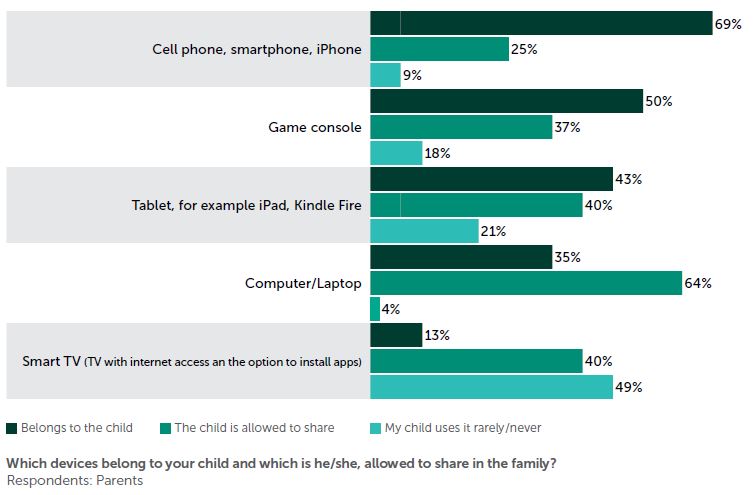
It is not surprising that with high levels of Internet use and devices shared, things can and do go wrong.
31% of parents said that their child had broken something on a device, and 30% of children had infected a device with a virus while online – two things that are particularly annoying if the devices are shared ones. 24% had been obliged to pay for something their child had ordered or downloaded, while 23% of parents said their child had accidentally deleted some of their data, with 16% of children accusing their parents of the same thing.
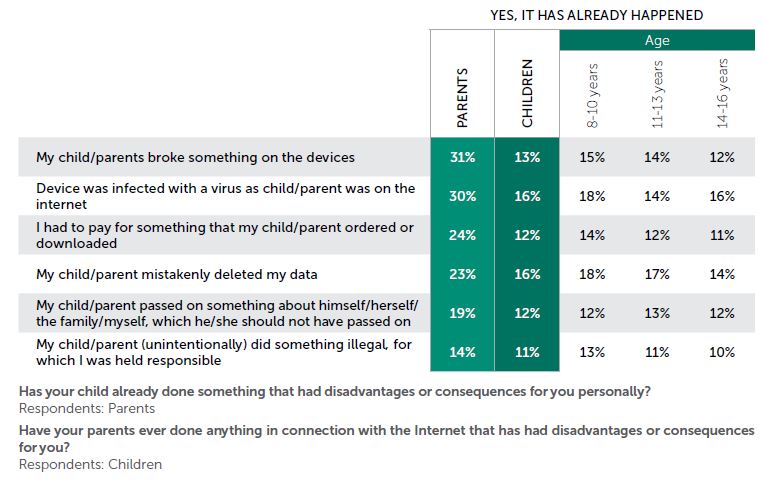
Conclusion
The study shows that use of the Internet can be a source of family conflict, particularly when devices are shared, or a source of teenage embarrassment when parents want to be friends online. It is vitally important that any potential flashpoints – such as virus infection or damage to shared devices, running up unauthorised costs etc. – are quickly resolved, not just for the sake of domestic harmony, but in order to protect vulnerable young people online.
One way of reducing the risks is through the use of an integrated home Internet security solution enhanced with additional Parental Control software. The first will block unwanted virus infection and more, while the second supports adult supervision by automatically blocking a child’s access to inappropriate sites or apps, preventing sensitive data from being shared and managing their device usage.
However, software alone is not enough. Educating a child or teenager is just as important, if not more so. And since using the Internet is increasingly a family activity, staying safe can be a family activity too. Parents should take an active interest in what their children do online. For example, in ‘befriending’ their child on social media parents can remain a part of their adolescent’s online life; set a good example of responsible social media behavior; and quietly monitor their child’s activity for potential danger or indiscretion. Such activity should be complemented by an ongoing dialogue with children about how to spot and respond to potential dangers. Parents and children can work together to agree some basic rules and revisit these rules and conversations on a regular basis as children develop and as technology and the online world evolve.
In short, parents need to help children carry over to their online lives the behaviors and values they all embrace as a family in the real world. Then they can all reap the benefits of technology together.
 Kids Safety
Kids Safety

